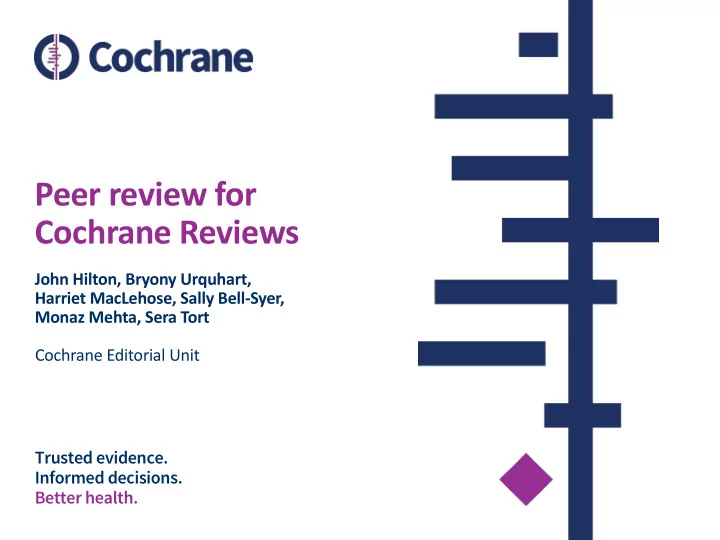

Peer review for Cochrane Reviews John Hilton, Bryony Urquhart, Harriet MacLehose, Sally Bell-Syer, Monaz Mehta, Sera Tort Cochrane Editorial Unit Trusted evidence. Informed decisions. Better health.
Disclosures of conflicts of interest John Hilton, Bryony Urquhart, Harriet MacLehose, Sally Bell-Syer, Monaz Mehta, Sera Tort Employed by Cochrane
Overview • Background: Why? How? When? • Policy development process • What the policy covers • Some key areas of policy • Review Group survey • What’s next • What’s happening in peer review?
Background • Cochrane Editorial Unit supports Cochrane Review Groups, and works to improve quality and the Cochrane Library • CRGS have policies, but no Cochrane-wide policy on peer review • Policy to be supplemented with supporting guidance • Peer review is a hot topic: is it doomed or thriving?
Why do we need a policy? FOR EDITORIAL TEAMS FOR AUTHORS To provide clear expectations, To provide clarity around the standards and guidance for peer review process for managing the peer review authors embarking on a process. Cochrane Review. FOR PEER-REVIEWERS FOR USERS To provide a framework for To provide clarity about peer-reviewers working across Cochrane’s peer review CRGs. process, both in general and for specific reviews.
What’s different about Cochrane? ‘Peer referee’ versus ‘peer review’ • Consumers • Multiple Review Groups • Peer review not usually accept/reject • Cochrane Reviews and long and complex • Evidence-based • But in general the same principles and same challenges as faced by authors, editors and peer reviewers everywhere.
Editorial policy development Advisory Execs Sign-off Topic identified Small working group and EPPR group
Peer review policy development Workshop Oct 2015 Draft policy development Advisory Group formation Policy revision Survey Draft policy completed Consultation Nov 2016 Revision, Sign-off, Publication Communication Implementation Audit
What’s included • Type of peer review • Number and expertise of peer reviewers • Declarations of interest for peer reviewers • Acknowledgement and credit for peer reviewers • Peer review turnaround time • Ensuring that authors address reviewers’ comments • Feedback to peer reviewers • Inviting peer reviewers to be authors • Editorial roles
What’s included (continued) • Peer review checklists • Peer reviewer conduct and ethics • Conflict resolution • Review Group peer review policies and procedures • Research into peer review • PLUS supporting guidance
What’s not included • Post-publication peer review • Open (published) peer review
Open (named) peer review Should peer reviewers identities be known to authors and other peer reviewers? PROS CONS Transparency Some reluctance Open science Less honest Less one-sided Biases (+ and -) Better reviews? Bland reviews? Interests exposed Reluctance Evidence? Limited and seems to vary between journals and settings.
Reviewers: how many reviewers and what expertise? At least one clinical/topic specialist, with a minimum of • one external to the CRG. PLUS one statistician/methodologist (if the review • deviates from standard methods or uses complex methods). Aim to include (if relevant) at least one consumer (or • user) peer reviewer
Peer review of updates • Full or selective peer review? • Always need peer review? • What’s changed? >> Decision flowchart
Published peer review policies
Survey of Review Groups • Inform implementation of new policy • Help to identify where additional guidance would help • Share best practice • Inform future policy development 50 Review Groups responded.
Survey: summary of findings All CRGs carry out peer review; about half have a documented • policy Open (named) peer review is commonly used • Most CRGs use the standard Cochrane peer review forms, or a • modified version Most CRGs publish the names of their peer reviewers • Feedback is often provided to peer reviewers; opportunity for • further incentives The most challenging aspects of peer review relate to time: • getting reviewers to respond to the invitation, the time it takes peer reviewers to return comments, finding specialist peer reviewers, and overall the time it takes to organise peer review.
Implementation Publish & communicate Policy Support updates Additional Monitor, support or feedback & modify policy audit
What’s next? Draft policy finalisation Policy consultation, via Review Group Executives Policy revision and sign-off Cochrane Editorial and Publishing and Policy Resource updated and communicated Webinars, presentations, guidance Plan for monitoring, audit and feedback
Supporting guidance How to find peer reviewers How to keep peer reviewers How to improve quality of peer reviews How to speed up peer review How to involve consumers and users How to handle ethical issues Introducing new peer review processes Managing feedback
Research Opportunities for research! Within groups; between groups; comparing with non-Cochrane
Thank you Peer Review Advisory Group: Deirdre Beecher, Ruth Brassington Chris Eccleston, Karen Robinson Susan Wieland, Caroline Struthers Melina Willson, Richard Wormald CRG staff who responded to the survey
Monument to an anonymous peer reviewer https://www.kickstarter.com/projects/972533097/monument-to-an-anonymous- peer-reviewer/description
Recommend
More recommend